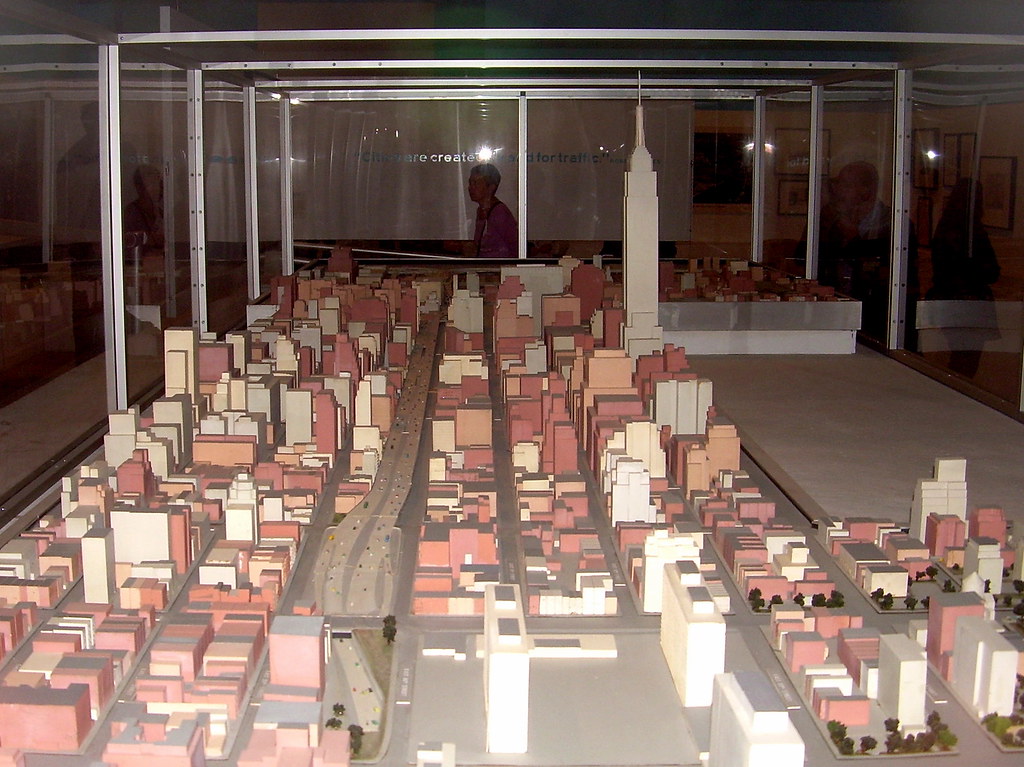Robert Moses Wrap-up
 Last Saturday, Kate and I went up to the Museum of the City of New York to see the final installment of "Robert Moses and the Modern City," the tripartite retrospective devoted to the impact and legacy of the former city planner. This one, titled "Remaking the Modern City," focuses mostly on roads, bridges, and other aspects of the city's transportation infrastructure (especially in Manhattan and the Bronx), though there are also displays on other projects like Lincoln Center and Central Park.
Last Saturday, Kate and I went up to the Museum of the City of New York to see the final installment of "Robert Moses and the Modern City," the tripartite retrospective devoted to the impact and legacy of the former city planner. This one, titled "Remaking the Modern City," focuses mostly on roads, bridges, and other aspects of the city's transportation infrastructure (especially in Manhattan and the Bronx), though there are also displays on other projects like Lincoln Center and Central Park.The exhibit (which, by the way, runs only through Memorial Day) evinces the same revisionist tone as the other two, and argues that the only way to fully assess the mark that Moses left on New York is through providing the necessary historical context, and by presenting both the man and his motivations as being much more complex than they are often portrayed. In other words, the remarkably pervasive caricature of Moses as imperial megalomaniac, decimating entire neighborhoods with haughty indifference, is both overly simplistic and ahistorical.
Not that the exhibits are especially apologetic, mind you. A focal point of this one, for instance, is a 10-foot long scale model of midtown with the multi-lane elevated Mid-Manhattan Expressway running where 30th Street used to be (see the picture below). It was never built, of course, and I don't think anyone these days can look at something like that without reflexively wondering, "what the hell was he thinking?" Other examples of Moses' failures and defeats -- like his proposed bridge connecting lower Manhattan and Red Hook, Brooklyn, which would have turned Battery Park into a multi-leveled maze of access ramps -- are presented as well.
Most of the current anti-Mosaic sentiment, of course, is derived from (or, at the very least, influenced by) Robert Caro's highly critical and widely-read 1974 biography of Moses, The Power Broker. But implicit throughout the entire exhibit (and just about spelled out at one point in the text) is the idea that perhaps Caro himself was a product of his time as well, and that the widespread sense of decay and doom pervading New York during the early 1970s necessitated pinning many of the city's woes on a scapegoat. Moses, who was at times demonstrably arrogant, racist, unconcerned about the lower classes, and who fervently wanted to reshape the city to accomodate the automobile, fit the bill perfectly. Now that the city has rebounded from its disco-era nadir, however (and become what is, essentially, a global luxury brand), these exhibits suggest that maybe it's time to take another look at things and reassess.
I'll leave it up to others to debate the details and argue about who's right or wrong or whatever. I don't know whether any ardent critics of Moses will have their views changed by these exhibits. In fact, I'd pretty much doubt it. But people often prefer simple explanations of things, and many tend to see historical events as black-and-white issues with clear heroes and villains. (As someone who's tried to explain to undergrads the complexities of events like Reconstruction, the Great Depression, and the civil rights movement, I speak from some experience here.) Overall, though, I think that the three exhibits generally succeed in their goal of demonstrating that the legacy of Robert Moses -- like virtually all history -- is sometimes much more complicated than it appears at first glance, and often defies oversimplification.
Anyway, don't forget to head up there this weekend if you've been meaning to see the exhibit. The portion at the Queens Museum of Art, by the way, runs through this Sunday, but the one at Columbia has already closed.
If you've read this far, and you're still interested in reading more on the whole Moses thing, try these articles in the International Herald Tribune, Metropolis Magazine, and the Washington Post.

Model featuring the Mid-Manhattan Expressway (looking west)


3 Comments:
I've been wanting to try this and good thing that I found this link. I'm opening up a blog in a month and this would be really helpful to me. Looking forward to see more tips and information here! :)
Its great to see that people are sharing quite profitable information with each other and now we can move our selves to a new era.ies
Very nice and impressive article you have posted. Its very helpful, i have read and bookmark this site and will recommend it to more other peoples.
Post a Comment
<< Home